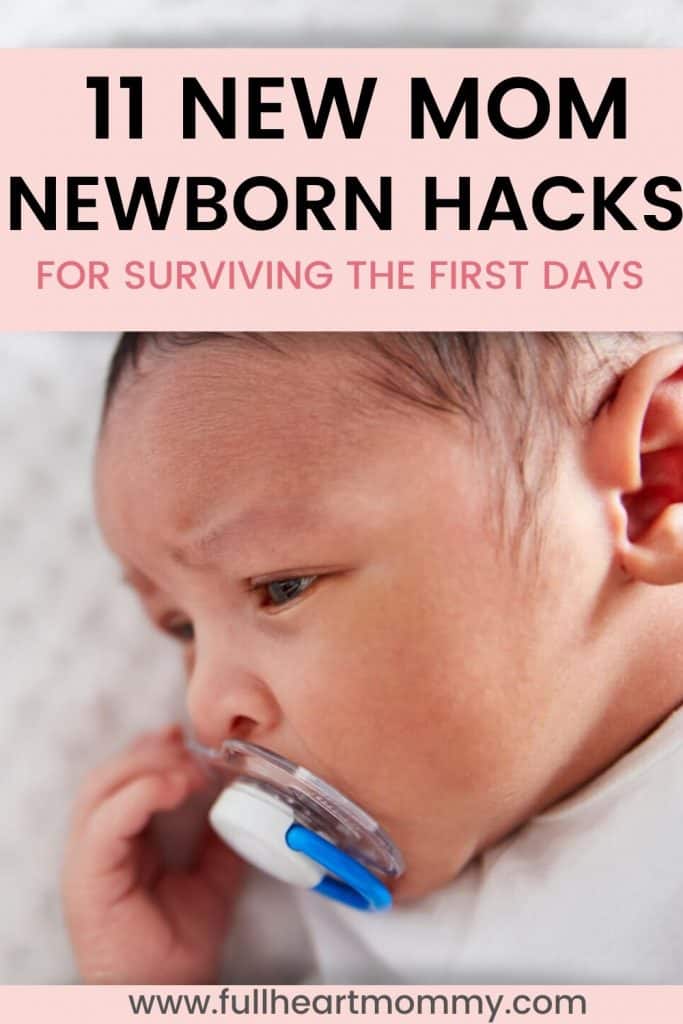
Surviving the first few weeks with a newborn might seem like an impossible feat if you’re a new mom. It also gets a little hairy if there’s been a gap between your kids or you’re transitioning to adding a sibling to the family.
Either way, there are a few ways to get ready and prepare yourself before your baby makes their long-awaited arrival.
In this post, we will talk about some of the most important things that you need to help you survive the newborn stage!
When Does The Newborn Stage Get Easier?

In the early weeks after my baby was born, I can vividly remember feeling exhausted, unprepared and thinking people were absolutely insane who told me to cherish the newborn months because I would miss them.
If you’re reading this post because you want to know when the newborn stage gets easier, I have an answer that you might not like.
It doesn’t get easier, but you get better. Sorry.
Each phase of your baby’s life will have its challenges. The best thing you can do is be prepared to learn what’s happening with your baby’s development.
Is it okay if all this stage feels like is eat, sleep and repeat? That’s perfectly fine.
“But I hate the newborn stage!”
That’s okay. You are going to make it through this one day at a time. Know that you are doing okay.
If you still are struggling with this idea of feeling stuck in this phase, here are some encouraging words for moms that might lift your spirits.
How Long Is The Newborn Stage?
Your baby is considered a newborn from from birth to about two months of age.
How do you get through these next 8 weeks without losing your mind?
It doesn’t matter whether you are a type A planner or just winging it, changing your mindset to roll with the punches and embrace the unpredictable of each day is so important.

Still Struggling With Your Newborn?
While it is important to “just be” during this newborn phase, there ARE some things you can can do to help you survive the newborn phase.
It is okay to do what you need to do just to get through the day, but I also want to share some helpful tips about transitioning home with your new baby.
These tips will help you with infant care, sleep and feeding. I’ll also share how to actually get things done with a newborn.
10 Truths To Know How To Survive The Newborn Stage

If you think that the first 6 weeks, or even 8 weeks are the hardest with your newborn use these tips and tricks to survive postpartum and the newborn stage of development.
1. Prepare the baby’s siblings
Introducing a new baby to older children can be daunting. We want more than anything for them to be the best of friends, but it’s important to understand that there may be a little jealousy and frustration from older children to begin with.

A great idea is to give a gift to the sibling from the baby. To keep them involved you could also read stories together and have them sit next to you whilst breastfeeding.
If you’re brave enough, you could even let an older child choose your baby’s middle name!
2. Get ready for newborn sleep struggles
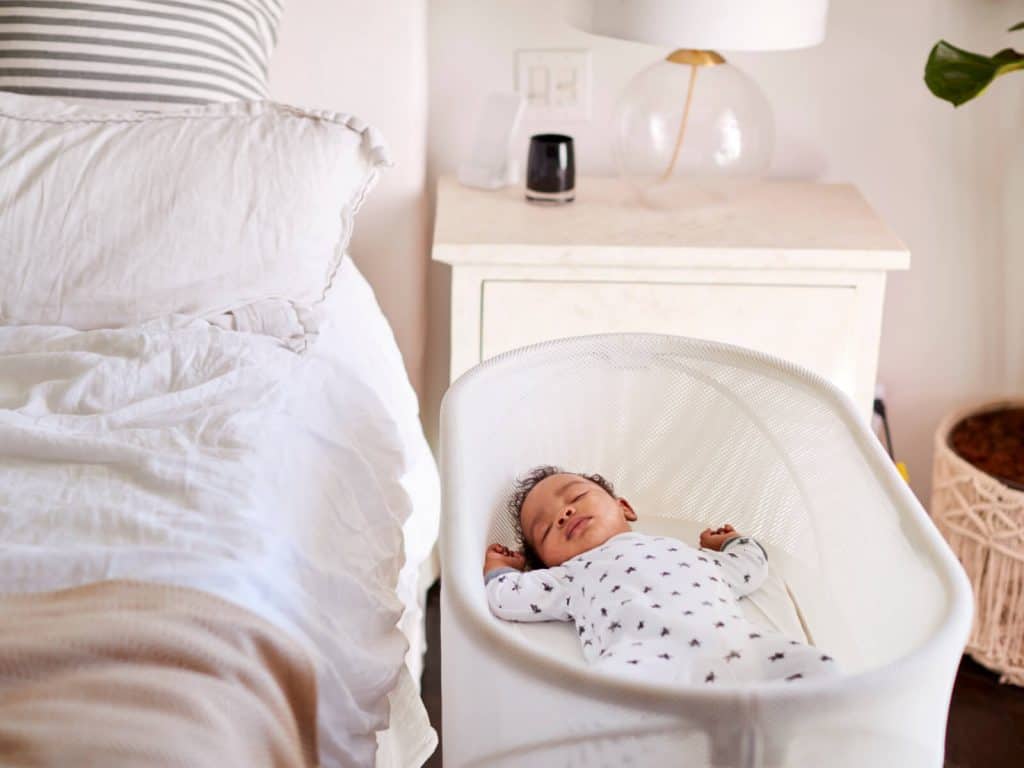
It will take a while for your baby to settle into the difference between nighttime and daytime – it’s important that you don’t push or rush this period, and don’t leave your baby to cry!
Some people want to know how to sleep train a newborn. Being left alone at night time can be really scary and overwhelming for tiny babies, you’re their safety blanket, and they’re going to need constant access to you for some time.
Instead of focusing on sleep training a newborn, start by helping your baby recognize the difference between night and day. Slow down in the evenings to show them when bedtime is coming.
It can also be a good idea to keep night feeds as quiet as possible – if you want to watch something to help you stay awake, consider using earphones to keep your baby as sleepy as possible.
Don’t worry about what time they are going to bed for at least a few months! Take them to bed when you go to bed, you’ll probably be more comfortable doing this anyway. As they get a bit older, you could start to put them in bed before you head up to bed yourself. This is completely up to you.
When they do go to sleep, make sure you know what to dress baby in for sleep at night.
Try to sleep when the baby sleeps – or call in some help! Someone coming to watch the baby for you for an hour while you nap will be the best gift that anyone can give you at this point.
Safe sleep recommendations advise that your baby sleep in your room but not in your bed – you should keep your baby in the same room as you for 1 year, or at least 6 months.
3. Getting Baby Safely Home
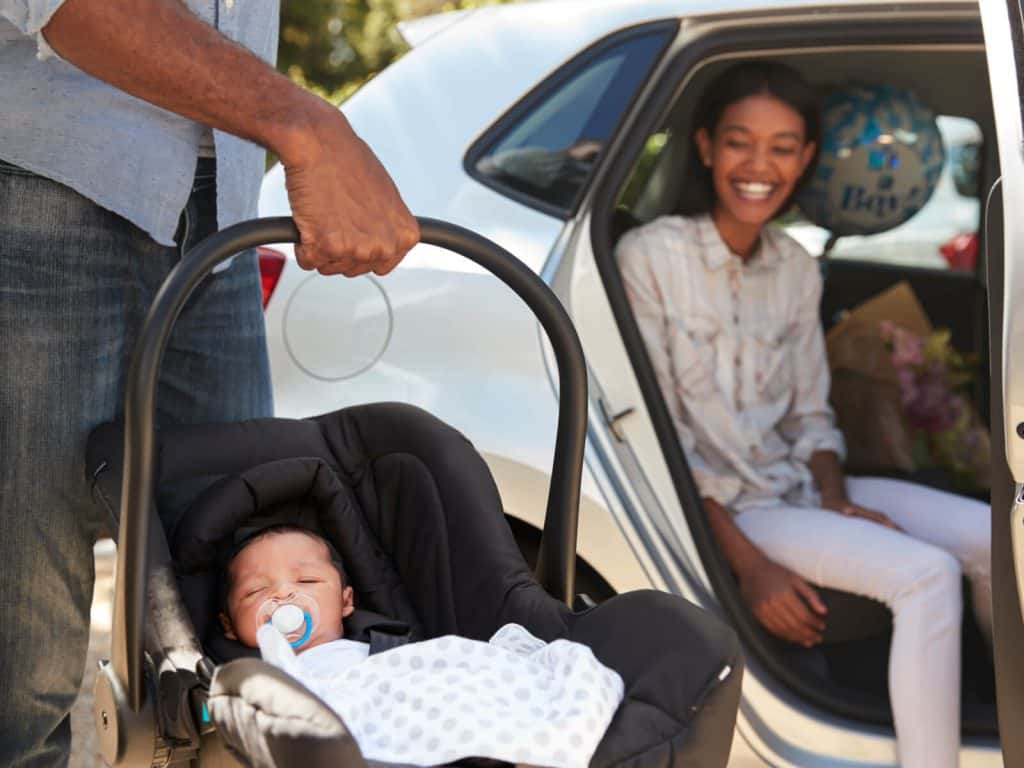
There are many things you can do when preparing to bring baby home for the first time. Get an expert to show you or watch some videos about how to install the car seat and how to use it. Bringing a baby home from the hospital with no idea how to install the car seat will be incredibly stressful for both you and your partner, so get a grip on it beforehand!
It goes without saying that having your car seat safely installed is important for keeping your baby safe during car trips. Every time that you buy a new car seat, make sure you know exactly how to secure it safely in the car.
4. Get ready for round the clock feeds
Your baby has a tiny tummy that gets filled very quickly but also means that they seem to be hungry again even faster. Unfortunately, they have little awareness of nighttime so these feeds will continue throughout the night too. They’re also really important so make sure you feed your baby every 2-3 hours throughout the day and night!
This can be exhausting, so see where your partner can help you out – maybe you can feed and they can get the baby back to sleep.
Try to clear your household tasks as much as possible so that you’re able to sleep when the baby sleeps and not have to worry about the next thing on your to-do list. Which, for at least the next two months, is taking care of you and your baby.
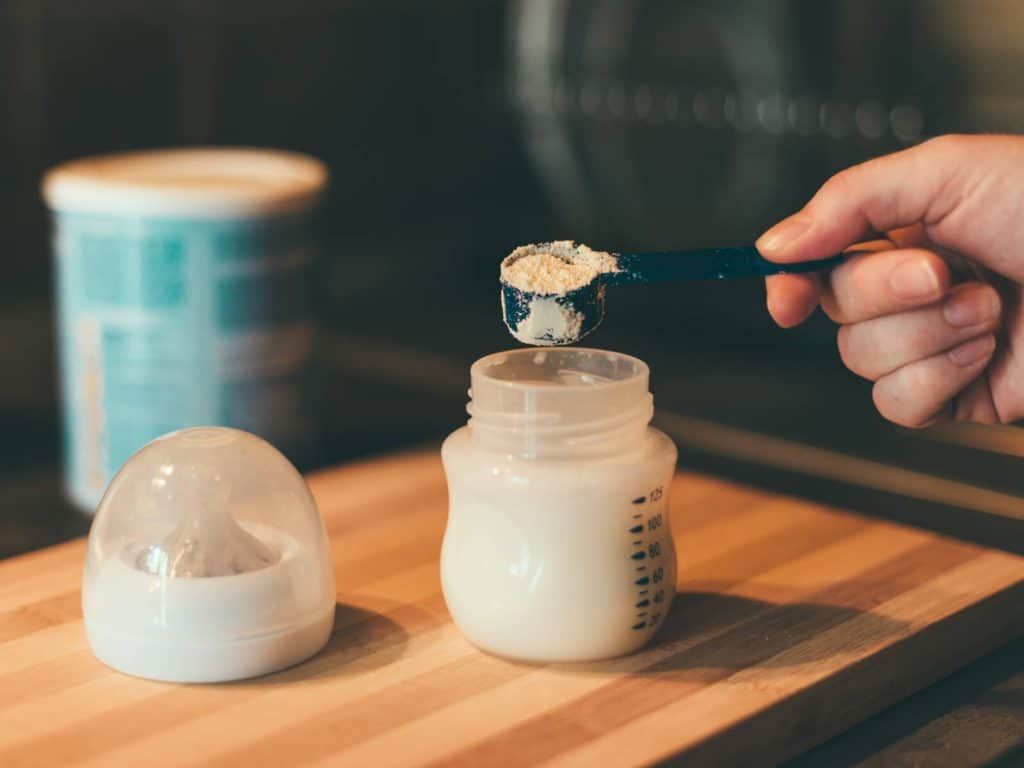
Try these formula feeding tips and tricks for easier feeds.
If you’re having difficulty with breastfeeding, don’t hesitate to speak to a lactation consultant or midwife who will be able to give you some tailored advice.
5. Learn how to care for the umbilical cord
Caring for your baby’s umbilical cord is an important task that staff at the hospital will probably talk to you about. Eventually, the cord will dry and fall off – this is usually 1-3 weeks after birth.
In the meantime, keep the area clean and dry at all times. Folding the edge of the diaper down to allow air to get to the stump will help to keep it dry.
It’s important not to bathe your baby until their umbilical cord has fallen off – if you want to wash them before this you can give your baby a sponge bath.
6. Giving Your Baby A Bath

You don’t have to worry too much about washing your baby before their umbilical cord has fallen off – newborns don’t get very dirty! If you do want to wash your baby, only wash them 2-3 times per week – bathing them too often can dry out their delicate skin.
Before their umbilical cord has fallen off, you can sponge-bathe your baby.
Here’s what you need to do:
- Make sure that the room is nice and warm.
- Wrap your baby in a towel.
- Make sure that everything you need is within arms reach.
- Use a soft flannel and a tub of warm water.
- Uncover your baby’s bottom half and gently wash their skin.
- Cover their bottom half and gently wash the top half of their body.
- Make sure that your baby’s skin is nice and dry – pay particular attention to folds (genital area and armpits).
- Whilst washing, talk and sing to your baby to make it fun for your baby and keep them calm.
Not all babies like baths! If your baby hates baths, try again in a week or so.
7. Get familiar with the diaper changing basics

In the beginning, your baby’s poop will be black, eventually turning greeny-yellow. As unpleasant as it might look, it’s totally normal. And a bonus of breastfeeding is that their diapers usually don’t smell!
Generally, newborns will poop the same number of times as they are days old, up until they are about 4 days old – after which they will usually continue to poop 4 times a day.
8. Consider a baby carrier
Want to know how to get things done with a newborn? The answer is baby carriers! I used this soft wrap exclusively during the newborn phase and transitioned to a structured carrier once my baby got older and weighed more.
Baby carriers make it so much easier to do things at the same time as comforting your newborn. Keeping your baby close to your chest can also help to regulate their heartbeat and encourage bonding.
Have a practice with the baby carrier so that you know exactly how to get it on without help – that way it will be much easier to prepare your carrier and put the baby inside when the time comes!
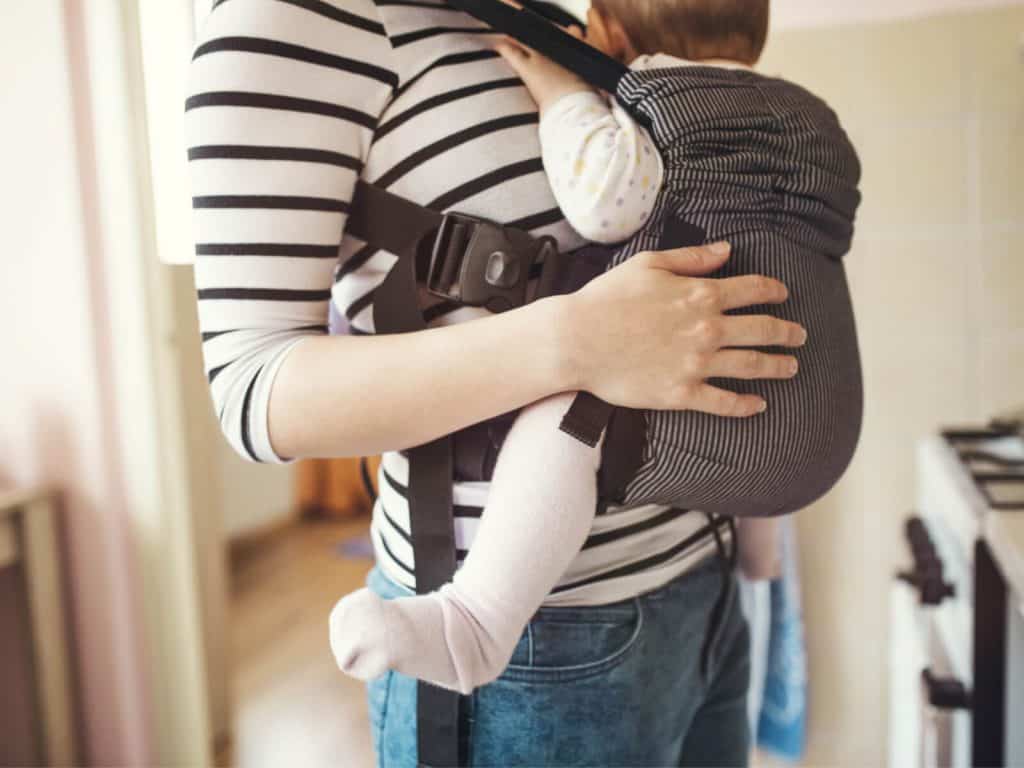
9. Make time for self-care
It’s totally ok not to shower for a week. But ignoring what makes us feel like ourselves can be a quick way for many of us to feel worse. Getting dressed in the morning and brushing your hair can be the difference between an awful and a great day. Just do what makes you feel good.
If you want to stay on the sofa in your pajamas for 2 weeks, do that. But if some clothes, a little mascara, and a 10-minute walk do wonders for your mental health and general mood, try to make some time for that too.
Related: 21 Self Care Ideas For Moms
Keep taking your vitamins and try to do a little something every day that makes you feel like yourself. That might be a few minutes of yoga, a quick walk, or a phone call with a friend. Your mental health is important too during this time, and it’s crucial that you, your friends, and your family are all aware of this.

10. Stock up on newborn and postpartum essentials
Before your baby arrives, make sure that you have plenty of diapers and wipes so that you can avoid late-night dashes to the grocery store – for a while at least!
Be sure to have at least 2 change of clothes ready every night – you’ll likely be changing your baby’s clothes during the night too. It’s incredible how much mess such tiny people can make!
If you didn’t get everything on your baby registry, be sure to go through this newborn baby checklist printable to make sure you have what you need at home.
Your postpartum essentials are important to have on hand to so consider making your own DIY postpartum care kit.

Having A Newborn Is A Big Change
You can do this!
Be sure to have friends and family ready to give their support, avoid Google at all costs, and find yourself a good series that you can watch during all of that wonderful family sofa time!
The newborn days are as wonderful as they are exhausting, it’s ok to feel overwhelmed! Things will get easier with time.
Assign jobs to everybody that visits the house, and enlist dad as much as you can into both household and baby tasks. Remember, it takes a village!

